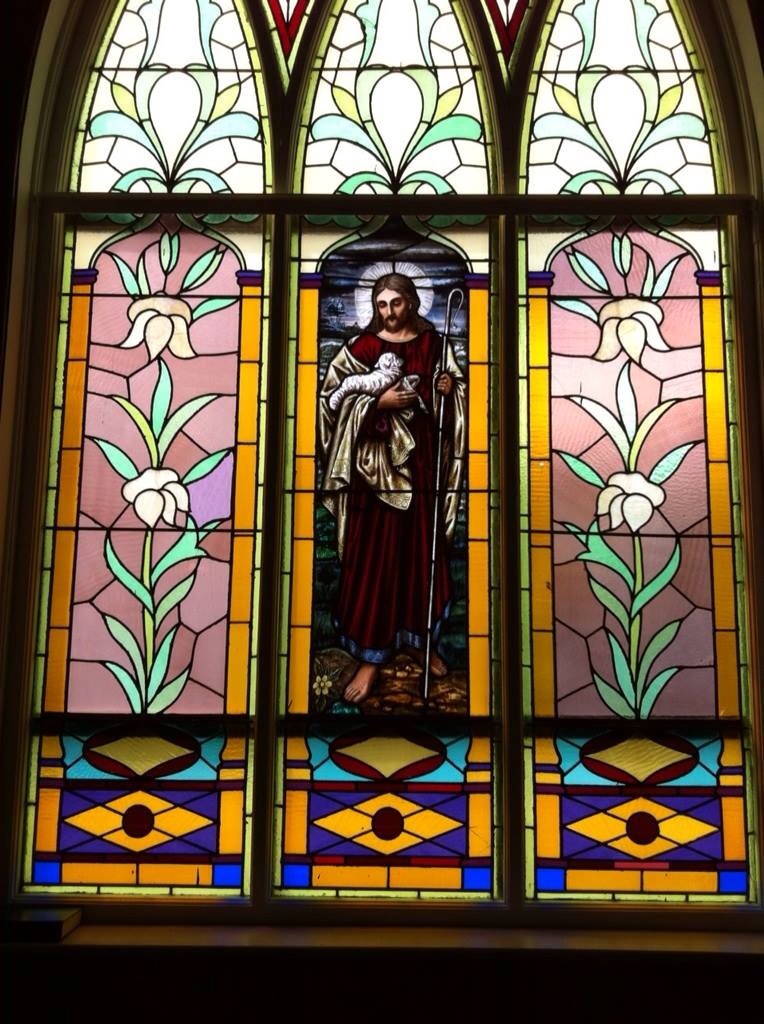
Since I often write about different hymns and other worship music, this guest post by Tsh Oxenreider, who writes at http://simplemom.net, seemed a natural addition.
I received this, by Tsh, through my subscription to (in)courage.me (http://www.incourage.me/2013/08/11-of-the-greatest-hymns-in-church-history.html), in a post called “11 Greatest Hymns in Church History.”
As I started reading, statements kept coming to mind, such as:
“she better not miss …”
“I bet she forgot …”
“… better be there”
And when I got to the end of her list of the “11 Greatest Hymns in Church History” I was in agreement with her choices. And, other than a few seasonal songs of faith (ie. “Silent Night” or “The Old Rugged Cross”) I think her list was complete …
… of course she did miss “Jesus Loves Me” … and if you have been reading my posts you will know how near and dear that one is to my heart. heck, I would make that one #1!
Nonetheless, she has a great assortment of hymns that have stood the test of time! I wonder what will be sung a hundred years from now …
“Plato once said, “Music is… wings to the mind, flight to the imagination, and charm and gaiety to life and to everything.” God has created music similar to certain extravagant parts of creation, like the redwoods and the turquoise Mediterranean waters and the northern lights: it begs us to stop everything and pay attention.
And when truly excellent music angles our attention heavenward? It changes you. And when enough lovers of God collectively listen to the words and the music—it can cause a shift in the Body, the Church. It changes us.
There are many, many hymns in thousands of languages throughout the history of the Church (all of which began first as poetry). But there are a few select hymns that have stood the test of time and are with us today because they have changed us as a Body. Their birth shifted our collective trajectory for the better.
Here are some of the greatest hymns to have changed the Church. I’ve included certain versions I love, plus a final playlist at the end.
(Note: I am a native English speaker, so my list of faves falls in that category—but there are countless hymns full of truth in languages all over the world.)
8th century
1. Be Thou My Vision
This humble prayer began as a medieval Celtic poem in the eighth century, but it wasn’t translated into English and put to music until 1905, by Mary Byrne.
Recording by Abigail Zsiga
1225
2. All Creatures of Our God and King
St. Francis of Assisi was known as a lover of nature and animals, and he also loved music. He wrote over 60 hymns, including this one in 1225 reflecting his compassion for creation. It caused the Church to stop and recognize the power and significance of nature, and not just human nature.
Recording by Patty Griffin
1674
3. Doxology
Thomas Ken was born in 1637 and orphaned soon after. Raised by his sister and her husband, he became an Oxford scholar and eventually became chaplain to members of royalty before becoming a bishop in the Anglican church. He wrote a manual of prayers in 1674, including a three-verse one simply named Morning Hymn. The doxology (which is simply a combination of two Greek words to mean ‘word of glory’) as we know today is the final verse of this poem, and it’s often sung without music.
Recording by Gungor
1758
4. Come Thou Fount of Every Blessing
Robert Robinson was a rather difficult, headstrong boy, so when he turned 14 in 1749, his mother sent him to London for an apprenticeship (his dad died several years prior). He got in to even more trouble in London, and when he was 17, went with some of his friends to a meeting to make fun of Christians where George Whitfield would be preaching. It moved him deeply, and began his search for God where he finally became a Christian three years later.
He became a pastor, and at age 23, he wrote this poem to accompany one of his sermons, its words full of admittance to his own fleshly nature compared to God’s divine. It was set to music in 1813.
Recording by Sufjan Stevens
1773
5. Amazing Grace
Considered a folk hymn, it was first published in 1779 but originally written for a New Year’s Day sermon in 1773 by John Newton, an English poet. Its focus is on the redemption found only in Jesus—a simple but profound truth during a lot of Church division.
The song actually wasn’t too popular until the American 2nd Great Awakening in the early 19th century, and it then became widely known as an African American spiritual.
Recording by Jadon Lavik
1835
6. Just As I Am
When poet Charlotte Elliott was at a dinner party in the early 19th century, an elderly man asked her if she was a Christian. She considered his question inappropriate, but later asked him what he meant. Charlotte eventually decided to follow Christ after talking with him, and wrote Just As I Am in 1835 soon after, remembering his words that she could come to Jesus “just as she was.”
This later became a popular song during Billy Graham’s crusades in the 20th century.
Recording by Nichole Nordeman
1861
7. Holy, Holy, Holy
Reginald Heber’s widow found the words to his poem written in private (we’re not sure when), but it was years later, in 1861, when a publisher found it and asked John Dykes to compose the music. He wrote it in 30 minutes and first named it Nicea, in honor of the First Council of Nicea in 325, the first effort to attain consensus in the Church.
Recording by Sufjan Stevens
1863
8. Before The Throne
Charitie Lees Smith was the daughter of an Irish pastor and his wife, and in 1863, at age 22, she wrote a poem called The Advocate to accompany one of his sermons. She continued to write other poems and eventually had them published in 1867 in a book titled Within The Veil.
Almost every line of her poem is taken directly from different parts of Scripture, making it rich with theology—useful for sermons. We’re unsure when its name was changed and music was written for accompaniment.
Recording by Shane & Shane
1873
9. It Is Well
Abolitionist activist Horatio Spafford had a nice life in the Chicago suburbs with his wife and five children and always welcomed guests in their home. Then in 1870, his 4-year-old died of scarlet fever, and in 1871 the Great Chicago Fire destroyed most of his investments (which were in Chicago real estate).
In 1873, the family wanted to sail to Europe for much-needed time away from their tragedy and to help in a revival, but on the day of departure, Horatio had a last-minute business emergency. He sent the family on ahead and planned to follow on another ship in a few days. But their ship was struck by another ship and sank in 12 minutes—the remainder of his four children died and only his wife was saved and brought to England. He immediately set sail to be with his wife, and as his ship passed the place where his daughters drowned, he penned It Is Well, and music was composed to accompany it in 1876.
Recording by Sara Groves
1885
10. How Great Thou Art
Carl Bobert was a Swede was walking home from church and listening to the church’s bells in 1885. A sudden, awe-inspiring storm gripped his attention, and then just as suddenly as it arrived, it subsided to a calm. After watching this display of nature, he went home and penned this poem. He published it in 1886, then it was matched to a Swedish folk tune in 1888, and then translated in to German in 1907, Russian in 1912, and finally English in 1925.
Recording by Martina McBride
1923
11. Great Is Thy Faithfulness
Thomas Chisolm spent most of his life sick, but in a rare bout of health, he went on a missions trip. While traveling, he corresponded with William Runyan, a good friend of his, and they often exchanged poems they had written. Runyan found this poem of Thomas’ so moving that he composed music to accompany it, publishing it in 1923. It wasn’t noticed until several years later by a Moody Bible Institute professor, who requested it be sung in their chapel services.
Recording by Sarah Macintosh
There are many, many more hymns (heck, I didn’t even touch any of the 6,000 hymns written by Charles Wesley!). They are poetry of our history, and I think it’s important to keep teaching these words and melodies to the next generation, so that we can keep these doctrinally-rich hymns in the Church.
Here’s the playlist, so that you can pipe each of these hymns throughout your home or in your ears today. They’ll help keep your focus heavenward.
Which hymn is your all-time favorite?
{Photos by Tsh}
Read Full Post »




 I believe that God heard Jobs cry, I believe that God accepted Jobs praise, through his lament, through his tears and through his not seeing or understanding the big picture that God could see. And, I believe that Jobs tear-filled praise of the name of the Lord was sweeter than honey to the ears of God. Not because Job gave God praise that was due to Him (although it was), but because despite the outer turmoil that Job was facing and experiencing, head on, he gave his praise to God … anyway. He praised because that was what he was created to do. It was his main purpose, and he was fulfilling it … even though he was suffering.
I believe that God heard Jobs cry, I believe that God accepted Jobs praise, through his lament, through his tears and through his not seeing or understanding the big picture that God could see. And, I believe that Jobs tear-filled praise of the name of the Lord was sweeter than honey to the ears of God. Not because Job gave God praise that was due to Him (although it was), but because despite the outer turmoil that Job was facing and experiencing, head on, he gave his praise to God … anyway. He praised because that was what he was created to do. It was his main purpose, and he was fulfilling it … even though he was suffering. the possible reasons (excuses?) I had guessed that people in church might not be singing.
the possible reasons (excuses?) I had guessed that people in church might not be singing.






 stone. Historically, the laying of the cornerstone was often ceremonial, much like now, when we have a sod-turning photo opportunity. The cornerstone would often have an inscription carved into it (often with the date of construction beginning), and/or it would contain objects, acting as a time capsule.
stone. Historically, the laying of the cornerstone was often ceremonial, much like now, when we have a sod-turning photo opportunity. The cornerstone would often have an inscription carved into it (often with the date of construction beginning), and/or it would contain objects, acting as a time capsule.